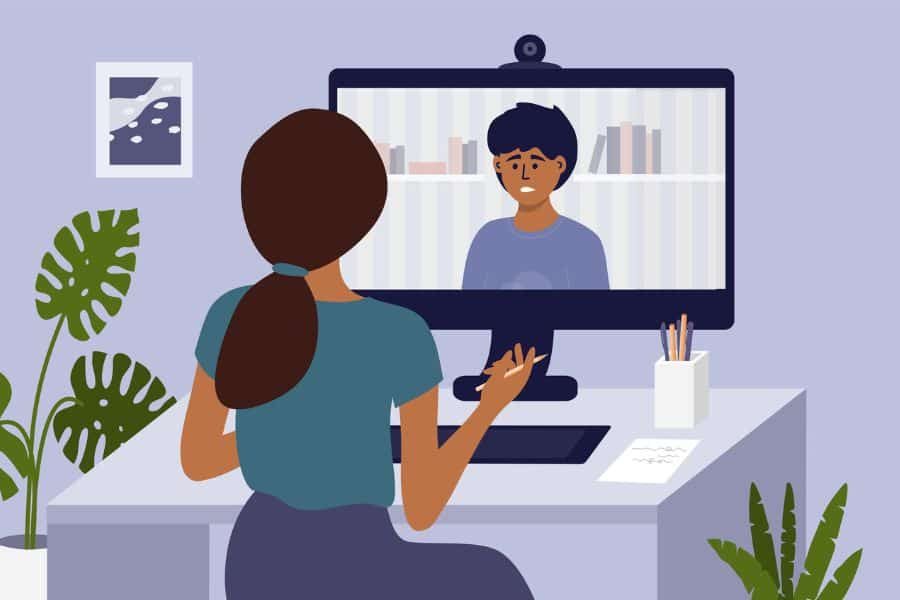Understanding Online Therapy
Jumping into online therapy for depression might feel like a big step, but we’re here to make it easy. Let’s break down just how awesome and accessible virtual therapy can be.
Benefits of Online Therapy
Online therapy has some neat perks for anyone looking for mental health support. Let’s chat about them:
-
Convenience: Picture this – no more rushing through traffic or spending time in a waiting room. You can dive right into your therapy session from your couch or kitchen table. Perfect for folks juggling tight schedules or those who might not be able to travel easily.
-
Affordability: Online therapy often doesn’t cost an arm and a leg like traditional office visits might. With fewer overheads like office spaces, therapists can offer more affordable rates. Plus, some health insurance plans lend a hand with covering costs (Verywell Mind).
-
Anonymity: Sometimes, the hardest part about therapy is the fear of judgment. Online therapy gives you a layer of privacy so you can chat without worries, whether you’ve got a formal diagnosis or are just feeling a bit off (Verywell Mind).
-
Accessibility: Whether you work funky hours or live out in the boonies, virtual therapy can still be there for you. No need for a lengthy commute to find someone you click with.
Accessibility of Online Therapy
The digital age has expanded mental health services like never before. Check out why:
-
Geographic Reach: Online therapy lets folks from small towns or isolated places access quality mental health care that might have been out of reach before. This is a lifeline for many in rural spots or places lacking specialists.
-
Flexible Scheduling: You can book your session at a time that suits you, whether that’s after work or on a lazy Sunday morning. Ideal if you’re balancing work, kids, or other commitments (Everyday Health).
-
Inclusive Access: For anyone who’s housebound or has mobility issues, online therapy can be a real game-changer. It brings the therapist to you, no matter where you are (Verywell Mind).
-
Affordability: Since it’s usually lighter on the wallet, online therapy is open to more people. With many insurance policies stepping up to cover it, getting help is more doable for many.
| Feature | Traditional Therapy | Online Therapy |
|---|---|---|
| Convenience | So-so | Top-notch |
| Cost | Steep | Wallet-friendly |
| Anonymity | Low | High |
| Geographic Accessibility | Limited | Wide |
| Scheduling Flexibility | Restricted | Anytime you want |
Online therapy blends ease, fair pricing, and wide reach, making it a smart pick for handling depression. Want to get started? Peek at some online therapy services that cater to depression and find your fit.
For tips on helping someone with depression or exploring natural remedies for depression, check out the links.
Efficacy of Online Therapy for Depression
Research Findings on Online Therapy
Turns out, getting help from your couch works pretty well. Studies have shown that online therapy, or “talking with your phone or computer,” as we like to call it, can really help in kicking depression to the curb.
In a deep dive into the digital shrink world, one clever study found that folks new to therapy saw a big drop in their depression when doing it online. It seems online chatting might suit first-time users like a cozy sweater.
BetterHelp did some number-crunching with 318 users and surprise, surprise—they found people felt better and able to cope after using their platform. Curious about what BetterHelp’s dishing out? Check out our breakdown on BetterHelp: Features and Benefits.
| Platform | Sample Size | Symptom Improvement | Notes |
|---|---|---|---|
| Fancy New Platform | N/A | Big Time | Newbies seem to love it |
| BetterHelp | 318 | Big Time | They’re getting those sad feelings out |
This mirrors what other smarty-pants researchers are saying: internet-based therapy rocks for mild to moderate depression. Online Cognitive Behavioral Therapy (CBT) is showing results just as awesome as traditional in-person sessions, and the benefits stick around. For the scoop, check out cognitive behavioral therapy for depression.
Effectiveness of Different Platforms
Not all online therapy hangouts are created equal. Let’s peek behind the curtain at some of these digital platforms:
BetterHelp
This platform’s kind of a big deal—folks have seen those depression blues fade away here. BetterHelp’s all about offering a buffet of therapy flavors, ticking a lot of boxes for different needs.
Talkspace
Talkspace keeps it modern, offering therapy chats via text, video, or even voice messaging. If you’re craving flexibility and don’t mind a bit of typing or face-to-face time with your screen, this one’s for you. Don’t miss our full review of Talkspace: Services and Offerings.
Brightside
Brightside zeroes in on anxiety and depression, blending therapy with medication management when needed. Look into what makes it shine in our piece on Brightside: Specialization in Anxiety and Depression.
| Platform | Strengths | Specialization |
|---|---|---|
| BetterHelp | Versatile, Lots of therapy flavors | General mental health |
| Talkspace | Chill, Numerous ways to connect | General mental health |
| Brightside | Research-focused, Medication savvy | Anxiety and depression |
Remember, the magic doesn’t just happen because you log in. You gotta be in it for real, showing up ready to work on it with your therapist. Check out our guide for some coping strategies for depression.
The proof’s in the (cyber) pudding: online therapy can be just as effective as the brick-and-mortar kind. If you pick the right spot and stay committed, online therapy might just be the trick for ditching those depression blues and lighting up your days again.
Choosing the Right Online Therapy Service
Picking the best online therapy for depression can make all the difference in keeping your spirits up and your mental health game strong. Each therapy service has its own quirks and benefits, helping you zero in on what fits your vibe best. Let’s take a closer look at three popular options: BetterHelp, Talkspace, and Brightside.
BetterHelp: Features and Benefits
BetterHelp’s your go-to for talk therapy, hands down. You get four therapy chats a week, all-you-can-text between sessions, and group chats if you’re feelin’ it. According to Everyday Health, 77% of peeps said it was a breeze swapping therapists when needed, which tells you just how flexible this one is.
Key Features:
- All Over the Place: Available in every US state and 200+ countries, so it doesn’t matter where you’re at.
- Go With the Flow: Tons of time slots and ways to do therapy.
- No Hard Feelings: Swap therapists easily if one doesn’t click.
- Extra Support: Group therapy is in the mix too.
Curious about BetterHelp? Check our details in the psychotherapy for depression section.
Talkspace: Services and Offerings
Talkspace gives you a bag of tricks to deal with different mental health twists and turns. Therapy can happen on your terms–whether you’re texting at lunch or video chatting from your couch.
Key Features:
- Options Galore: Solo, couple, and teen therapy covered.
- Chill Schedule: Your phone’s now your therapy couch—text, video, or voice it up.
- Pro Tips: Real-deal licensed therapists handling all sorts of issues.
| Feature | Description |
|---|---|
| Pricing | Changes based on your plan |
| Communication | Text, video, voice |
| Specialization | Tackles a bunch of things |
Check out more coping hacks with coping strategies for depression at Talkspace.
Brightside: Specialization in Anxiety and Depression
Brightside shines bright for worries and the blues (Verywell Mind). It’s like a one-stop-shop where therapy and meds tag-team your troubles for a comprehensive win.
Key Features:
- Focused Feels: Spots anxiety, panic hops, and the blues right on.
- Meds Meet Therapy: They’ve got med management rolled in.
- Insurance Savvy: Covers lots of insurance plans.
- Variety Packs: Pick from different subscription offers.
See how Brightside kicks in with natural remedies for depression.
Picking your mental sidekick online means looking at things like availability, flexibility, how you wanna chat, and what you need. Tap into our guides on stuff like cognitive behavioral therapy for depression and mindfulness for depression to boost your sessions.
By getting the 411 on these platforms, you’ll be ready to make a smart call and steer your mental wellness journey smoothly.
Factors Influencing Online Therapy Success
Sorting out what makes online therapy work can help you make smart decisions about your mental health care. Here’s the scoop: The type of program and how much you dive into it are pretty big players in the game.
Therapist-Guided vs. Self-Guided
In the world of online therapy, you’ve got a couple choices—do you go for the real-deal therapist or the DIY route?
Therapist-Guided Therapy: Here, you regularly chat with a licensed therapist. Research suggests that tapping into therapist-led digital CBT (that’s electronic Cognitive Behavioral Therapy) can be pretty effective for tackling Major Depressive Disorder (MDD). The magic really happens when you click with your therapist and stick to the program (Frontiers in Psychiatry).
Self-Guided Therapy: These are usually packed with modules and materials you go through solo. They can be helpful, sure, but with less human touch, it’s easy to see motivation and success slipping a bit (Journal of Medical Internet Research).
| Therapy Type | Features | Benefits | Cons |
|---|---|---|---|
| Therapist-Guided | Regular chats with a pro | High follow-through; personal connection | Costs more, requires scheduling |
| Self-Guided | Modules and resources at your pace | Flexible, won’t break the bank | Less support, motivation risks |
Choosing between these options might hinge on what suits you best, how you’re feeling, and whether you seek a pro’s guidance.
Engagement and Compliance
How well online therapy works also rides on how much you get involved and stick with your treatment plan.
Engagement: Dive in and show up for your therapy sessions and activities—this makes all the difference. Being involved helps create a bond that’ll likely lead to better outcomes (Frontiers in Psychiatry). The more you’re in it, the more likely you’ll stay on track.
Compliance: Staying on top of your therapy schedule and doing the exercises can make all the difference in how well things work out. Built-in reminders and check-ins in some programs can give you that extra nudge to keep going.
For tips on maintaining your mojo, pop over to our tips on coping strategies for depression.
Here’s a peek at how engagement and compliance compare in these therapy types:
| Therapy Type | Engagement Importance | Compliance Tracking |
|---|---|---|
| Therapist-Guided | Very important for therapist bond | Therapist checks in |
| Self-Guided | Motivated by you alone | You’re your own boss |
Getting a grip on these factors can help you untangle the online therapy experience and make choices that’ll boost your mental health adventure. For more resources, take a look at psychotherapy for depression or cognitive behavioral therapy for depression.
Comparing Online and In-Person Therapy
Deciding how to tackle your depression? Getting a grip on the differences between online and in-person therapy can seriously make your life easier. Both options have their ups and downs, and knowing what suits you best could be the game-changer.
Effectiveness and Compliance Comparison
Whether you’re Zooming with your therapist or chilling on their couch, both are pretty solid as far as effectiveness goes. What really tips the scales is how much you put into it. Studies show virtual therapy is just as boss at kicking butt with mood and anxiety challenges, performing head-to-head with traditional face-to-face options when it comes to beating major depression (Psychology.org, NCBI).
One major win for online therapy is that people tend to finish what they start and show up more often – who doesn’t love some flexibility without the hassle of finding parking or coordinating schedules?
| Therapy Type | Completion Rate | Attendance Rate | Long-Term Efficacy |
|---|---|---|---|
| Online Therapy | Higher | Higher | Comparable |
| In-Person Therapy | Moderate | Moderate | Comparable |
Cost and Accessibility Factors
Wallet watching? You gotta consider this. On the digital flip side, online therapy sessions usually slide in between $65 to $109 a pop (Psychology.org), while seeing someone in person might make your wallet groan louder, especially if you’re smack in an urban area or seeking some specialized TLC.
| Therapy Type | Cost per Session | Additional Costs | Insurance Coverage |
|---|---|---|---|
| Online Therapy | $65 – $109 | None | Varies |
| In-Person Therapy | $100 – $200+ | Travel, Parking | Varies |
Plus, online therapy has a leg up when it comes to accessibility. This is perfect if you happen to be housebound, living further than the eye can see, or have some mobility issues. Imagine chatting with your therapist in PJs from your own couch, no travel stress needed. Also, you can even give yourself a nudge toward getting help – that means you can finally step into therapy’s wonderful world if you’ve been sticking around in the dark for too long (NCBI).
Check out our other articles on psychotherapy for depression or cognitive behavioral therapy for depression for a little more insight.
In a nutshell, whether you go down the virtual or IRL path, the magic lies in how much you dive into the process. Remember, it’s all about committing to making your mental health a priority, no matter which path you take.
Future of Online Therapy
Integration with Traditional Services
Online therapy for depression is popping up more and more in mental health treatment soup. Mixing it up with traditional therapy offers a bit of both flavors, blending digital smarts with good old face-to-face help. It’s like mashing up movies with books—sometimes you need both to get the full story. Of course, according to the Journal of Medical Internet Research, some therapists scratch their heads over this web-based therapy mix, pointing out some sweet perks and sticky pitfalls.
Here’s how these mash-ups might play out:
- Blended Therapy Programs: Think of it like mixing cereals, daytime sessions combined with a bit of digital flair—self-help tools and online check-ins.
- Coordinated Care: It’s all about chatting and teamwork, making sure everyone’s on the same page from your screen to the therapist’s couch.
- Supplemental Resources: Use the online world as a toolbox with extras like cognitive behavioral therapy for depression hacks and mindfulness for depression goodies.
| Integration Model | Description |
|---|---|
| Blended Therapy Programs | Mixture of in-person and online sessions. |
| Coordinated Care | Communication between online and traditional therapists. |
| Supplemental Resources | Online tools to complement in-person therapy. |
Challenges and Opportunities Ahead
The road ahead for online therapy is brimming with chances—though not without its bumps. According to NCBI, things like therapists’ views, rules and regs, and the human touch in digital chats are big hitters in the debate. Also, many therapists prefer a guidebook on mixing therapy with tech, as Journal of Medical Internet Research notes.
Challenges:
- Knowledge and Training: Getting therapists up to speed with tech talk and the right attitudes is a must for this stuff to fly.
- Legal and Ethical Concerns: Going through the red tape to keep patient data snug and sound.
- Consistency and Quality: Making sure digital therapy is as good as, if not better than, its traditional counterpart.
Opportunities:
- Improved Accessibility: Therapy through the internet cracks open the door for people tucked away in far-off places (NCBI).
- Cost-Effectiveness: More bang for your buck as online therapy snips those pricey in-person bills and brings mental help closer to everyone.
- Reduction in Stigma: Turning the sneaky shame dial down a notch, online options let folks seek help without everyone knowing their biz (NCBI).
The COVID-19 pandemic shoved online mental health services into the limelight thanks to social distancing and increased need, especially among the younger crowd (NCBI). The future is all about straightening out the kinks while grabbing onto the great bits, giving a full-package deal for tackling treatment for depression.
For more details on different therapy ventures, check out our pieces on natural remedies for depression, medications for depression, and psychotherapy for depression.










